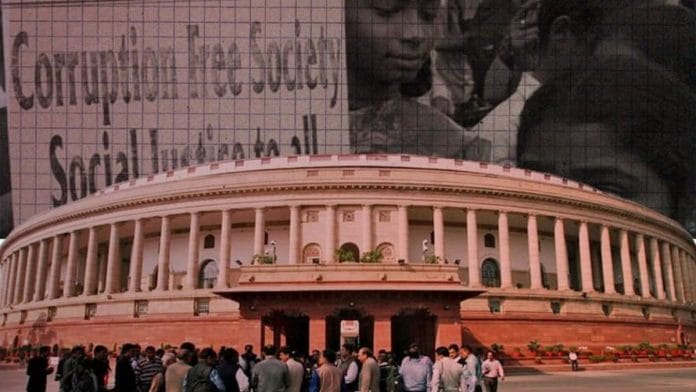Thank you dear subscribers, we are overwhelmed with your response.
Your Turn is a unique section from ThePrint featuring points of view from its subscribers. If you are a subscriber, have a point of view, please send it to us. If not, do subscribe here: https://theprint.in/subscribe/
Corruption in India is a deeply entrenched issue that affects various sectors, from politics and the bureaucracy to law enforcement and business. Despite the country’s impressive economic growth over the last few decades, corruption remains a significant obstacle to India’s development. It weakens democracy, erodes institutional integrity, and hampers economic progress. This article examines the scale, causes, effects, and ongoing efforts to address corruption in India.
India consistently fares poorly in global rankings related to corruption. Transparency International’s Corruption Perceptions Index (CPI) frequently places India in the lower half, highlighting pervasive corruption. The issue takes many forms, including bribery, nepotism, embezzlement, and favouritism. From small-scale corruption, where citizens might need to bribe for basic services, to large-scale embezzlement of public funds, corruption spans all levels of society.
Several key factors contribute to corruption’s persistence in India. One major issue is the absence of strong, independent institutions to enforce laws and regulations. Critical institutions such as the judiciary, law enforcement, and anti-corruption agencies are often understaffed, under-resourced, and susceptible to political pressure. Corruption is deeply embedded in Indian politics, where many politicians are accused of exploiting public office for personal gain. The lack of transparency in political funding and the heavy influence of money in elections only worsens the problem. The Indian bureaucracy, often criticized for being inefficient and slow, is fertile ground for corruption. The red tape and complicated regulatory processes create opportunities for officials to demand bribes to expedite work. Economic inequality also plays a role, with the wealthy and powerful exploiting their positions, while those living in poverty may feel forced to engage in corrupt practices out of necessity.
Corruption has become so normalized in India that many people accept it as part of everyday life. It’s common for individuals who complete their tasks on time, while accepting bribes or kickbacks, to be viewed as efficient. This creates a situation where the public not only accepts but often willingly participates in corrupt practices, offering bribes without question and even recommending those who engage in such behavior. This cultural acceptance makes eradicating corruption even more difficult.
The consequences of corruption on Indian society are profound and far-reaching. Corruption stifles economic growth by discouraging investment and raising the cost of doing business. It misallocates resources, diverting public funds away from essential services and into private hands. This, in turn, erodes trust in public institutions and weakens democracy.
When citizens lose faith in their leaders and institutions, the very foundation of democracy is threatened. Moreover, corruption exacerbates social inequality, disproportionately affecting the poor and marginalized, who may be denied access to basic services like healthcare, education, and justice if they cannot pay bribes. Environmental corruption also leads to the unchecked exploitation of natural resources, further damaging the environment.
Over the years, numerous measures have been introduced to combat corruption in India. Several laws, such as the Prevention of Corruption Act, 1988, and the Lokpal and Lokayuktas Act, 2013, have been enacted to fight corruption. The Whistleblower Protection Act, 2014, aims to safeguard those who report corrupt activities. Additionally, the government has launched digital initiatives to increase transparency and reduce corruption, such as the Direct Benefit Transfer (DBT) scheme, the Aadhaar system, and e-governance, which have helped to reduce leakages and ensure that benefits reach those who need them. The judiciary has also played a crucial role in tackling corruption, with several high-profile convictions sending a strong message against corrupt practices. Civil society organizations and the media are instrumental in exposing corruption and holding those in power accountable. Investigative journalism and activism have uncovered numerous instances of corruption. India has also participated in international efforts to fight corruption, such as the United Nations Convention against Corruption (UNCAC), and worked with global bodies to tackle money laundering and illicit financial flows.
Despite these initiatives, the fight against corruption in India remains a daunting task. The influence of money in politics, lack of accountability in public office, and the slow pace of the judicial process continue to impede progress. Moreover, since corruption is so ingrained in Indian society, legal reforms alone are not sufficient cultural change is necessary.
Addressing corruption in India requires a comprehensive approach. While progress has been made, much more needs to be done. Strengthening institutions, increasing transparency, empowering civil society, and fostering a culture of integrity are crucial steps in tackling corruption. Only through sustained and collective efforts can India overcome corruption and fully realize its potential as a thriving democracy and global economic leader.
These pieces are being published as they have been received – they have not been edited/fact-checked by ThePrint


